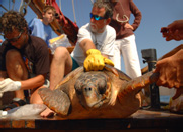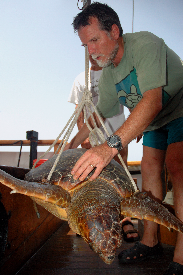EUROPEAN CETACEAN BYCATCH CAMPAIGN
"Man is but a strand in the complex web of life"
"Man is but a strand in the complex web of life"
Fishing deeper and changing bait reduces turtle bycatch
Earthwatch news release
9th March 2006
Turtle_enews06_jpg
Earthwatch scientists have revealed that the number of turtles accidentally killed by long line fishing could be reduced by as much as 80% if fishermen bait their hooks with mackerel and fish slightly deeper. Every year over 20,000 endangered loggerhead sea turtles are caught on the hooks of long lines used along the southern coast of Spain for catching swordfish.
Scientists Ricardo Sagarminaga van Buiten and Ana Canadas spent 30 days working with local fisherman on board a long line fishing vessel where they conducted fifteen experiments using a normal long line with forty baited hooks. When the fisherman substituted their traditional squid bait for mackerel and fished the hooks slightly deeper, the results revealed a significant reduction in turtle by-
"We are very pleased with the result of this experiment," says Ricardo Sagarminaga van Buiten. "Perhaps the most positive outcome is the interest we have received from local fishermen who are now willing to cooperate with us to find scientific solutions to the by-
The experiment, carried out with the assistance of the U.S. National Marine Fisheries Service (NMFS), was part of a long term research project initiated by the Alnitak Marine and Research Education Centre, the Spanish Oceanographic Institute, Dr. Scott Eckert from the Wider Caribbean Sea Turtle Conservation Network and Earthwatch. Since 1999, Earthwatch volunteer teams, lead by van Buiten and Canadas, have been working on board a 20-
Over the last two years the team has been deploying satellite linked data recording transmitters to loggerhead sea turtles in the western Mediterranean. This satellite telemetry indicates that the turtles reside mainly in the top six metres of the surface waters when passing through long lining fishing grounds. This finding led to the conclusion that setting longlines deeper could avoid the accidental capture of sea turtles, but it was unknown if this change in fishing method would effect swordfish catch until this experiment was conducted. The team hopes that this information will help them to mitigate the bycatch problem further and highlight the importance of international coordination for the conservation of these ocean voyagers.
"We are delighted to be associated with this excellent piece of applied conservation work, in which the scientific studies have been conducted with the fishermen to show how turtles can be better protected, whilst not reducing the fishermen's catch." says Dr Roger Mitchell, Chief Scientist at Earthwatch. "Earthwatch is always seeking new ways of managing the exploitation of natural resources to ensure that populations of both the species targeted, and those indirectly affected, are sustained over time."
For press information, images and interviews contact
Zoe Gamble, Senior Press Officer,
Earthwatch on 01865 318852 / zgamble@earthwatch.org.uk
Top

